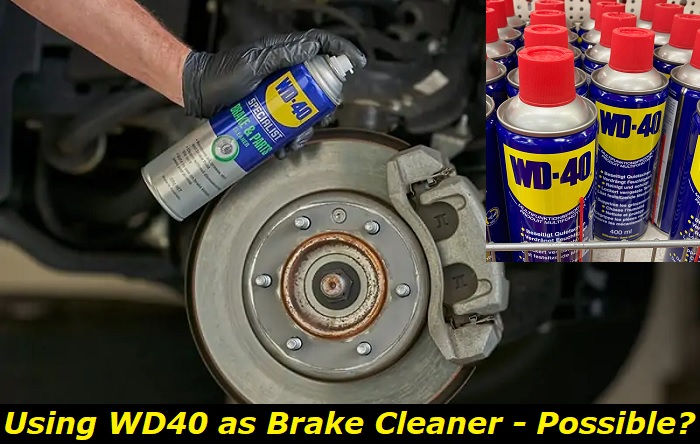My recommendation is to stay away from your brakes whenever you have a can of WD-40 in your hands! Using WD-40 on your brakes will lead to inevitable degradation of the brake pads even if the lubricant is washed down thoroughly. Also, it may lead to inefficient braking which is a serious safety issue for any car on the road. To avoid these dreadful consequences, keep your WD-40 can as far away from your brake rotors as you possibly can.
Brake pads problems highlights
- Level of urgency:super-urgent
- DIY diagnostics:possible but complicated
- DIY repairs:impossible
- Price for repair:$250 - $450
- Common symptoms:sounds when braking, unintentional braking, warped rotor
- Commonreasons:bad pads, improper installation, old pads
- If ignored:rotor wear, bad brakes, damage to the system

What's the point in using WD-40 on brakes?
When I was researching and trying to find out the roots of this unbelievable idea of putting WD-40 lubricant on brakes, I found that the Australian official WD-40 website has an article about using WD-40 on brakes. But if you read it carefully, this article is not about the all-purpose WD-40 lubricant. It's about the WD-40 special product - Specialist Brake&Parts Cleaner. So, this is basically the brake cleaner made by the company that makes the famous lubricant.
Maybe, this article sparked the myth that using WD-40 on your brakes will save them, clean them, and remove all rust. Maybe, there are some other sources that I failed to find.
But anyway, please be careful whenever you are applying anything on your brake rotors and pads. Bad decisions may lead to immediate problems and you may just lose control over your car during your next ride!
What will WD-40 do with brake discs and pads?
WD-40 is a lubricant. It will do nothing bad to the brake rotor. But it will lubricate its surface. And when the pad will touch the rotor next time, it will slip rather than work as it's intended to.
Also, the remains of WD-40 will most likely polish the brake pad and make it smooth. In this case, the brake pad will start slipping harder and harder till it actually stops doing its job completely.
That's why in all those not-really wise forum manuals that recommended cleaning brakes with WD-40, I usually read about cleaning the rotor after applying the WD-40 lubricant using brake cleaner or hot water. But you should be wiser than that and know that hot water won't clean all the lubricant off the metal surface. It will remain there for some time.
So, while WD-40 can clean the residues from the brake rotor, it can also harm the pads. Once you apply this to your brakes, you should immediately find the proper way to clean it. Of course, you better not apply this on your brakes at all.
Do you really need to clean the brakes?
Well, this is yet another myth from foxy car mechanics. They made it up basically to earn some money because this is another service procedure that a lot of people pay for when they have their cars maintained.
The answer is no, you won't need to clean your brakes. Brake cleaners are made for very specific cases when the brakes haven't been in use for months or years and now are all rusty. These cleaners shouldn't even be sold in car accessory stores.
I can't imagine a situation when a regularly driven car may require a brake cleaner. Your pads will be pressed to the brake rotor every time you press the brake pedal. It means that the pad will polish the brake rotor to the mirror surface. If this is not something that's happening in your car, you will probably need new brake pads or maybe there is a problem with the caliper and the brakes just don't work the proper way.
So, no, you won't need to manually clean your brakes if you drive your car regularly. Also, if a mechanic offers this service to you, you should deny it unless there are visible rust spots on the brakes.
What to do if WD-40 has been applied to the brakes?
If you already "cleaned" your brakes with WD-40 and are now reading this article, you shouldn't drive your car! Before your next ride, you should thoroughly clean the brake system with special brake cleaners.
Now, you need to get to the car accessory store or order one or two cans of good brake cleaner. Apply the cleaner according to the manual that comes with it. Only after the brakes are clean and dry, you can try driving the vehicle.
Also, after about a week, you should check the surface of the brake pads. If it's affected by the lubricant, you will most likely need to change the brakes to avoid dangerous situations on the road.
About the authors
The CarAraC research team is composed of seasoned auto mechanics and automotive industry professionals, including individuals with advanced degrees and certifications in their field. Our team members boast prestigious credentials, reflecting their extensive knowledge and skills. These qualifications include: IMI: Institute of the Motor Industry, ASE-Certified Master Automobile Technicians; Coventry University, Graduate of MA in Automotive Journalism; Politecnico di Torino, Italy, MS Automotive Engineering; Ss. Cyril and Methodius University in Skopje, Mechanical University in Skopje; TOC Automotive College; DHA Suffa University, Department of Mechanical Engineering






Add comment